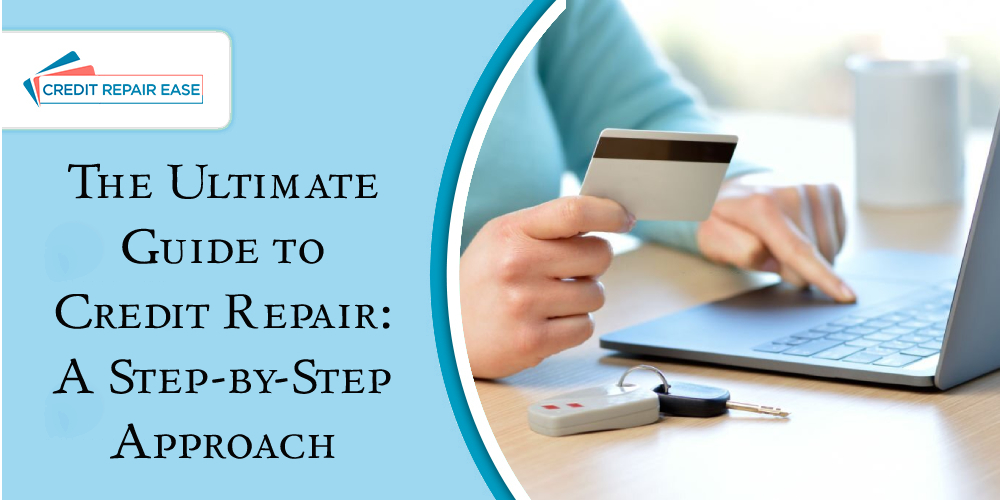The Ultimate Guide to Credit Repair: A Step-by-Step Approach
Credit repair is the
process of improving a person's creditworthiness by addressing and correcting
any negative information on their credit report. Poor credit can result in
higher interest rates on loans, difficulty obtaining credit, and other
financial challenges. Here is a step-by-step approach to credit
repair:
Obtain
a copy of your credit report
As an AI language model,
I don't have a credit report or the ability to obtain one. However, you can
obtain a free copy of your credit report from each of the three major credit
reporting agencies (Equifax, Experian, and TransUnion) once a year by
visiting AnnualCreditReport.com. You can also request a copy of your credit
report directly from each credit bureau, although you may be charged a fee for
this service. It's important to review your credit report regularly to check
for errors or fraudulent activity that could impact your credit score and
ability to obtain credit in the future.
Dispute
any errors on your credit report
If you find errors on
your credit
report, you should take immediate steps to dispute them. Some common
errors include incorrect personal information, accounts that do not belong to
you, late payments that were actually on time, and accounts that have been closed
but are still listed as open.
To dispute errors on your
credit report, you should follow these steps:
Review your credit report
carefully: Request a copy of your credit report from each of the
three major credit bureaus - Experian, Equifax, and TransUnion - and review it
carefully to identify any errors or inaccuracies.
Gather supporting
documents: Collect any supporting documents or evidence that can
help you dispute the error, such as receipts, statements, or correspondence
with the creditor.
File a dispute with the
credit bureau: Write a letter to the credit bureau that
issued the report with the error, explaining what is incorrect and providing
any supporting documents. You can also file a dispute online through the
bureau's website.
Contact the creditor:
If the error is related to a specific account, contact the creditor and explain
the error. Ask them to update the information with the credit bureau.
Follow up on the dispute:
Credit bureaus are required to investigate disputes within 30 days.
Pay
down debt
Paying down debt is an
important financial goal that can help you achieve financial stability and
reduce stress. Here are some tips to help you pay down your debt:
Make a budget:
Start by making a budget that includes all of your income and expenses. This
will help you identify areas where you can cut back on spending and allocate
more money towards paying down your debt.
Prioritize your debt:
Make a list of all your debts and prioritize them by interest rate, starting
with the debt with the highest interest rate. Focus on paying off the debt with
the highest interest rate first, while continuing to make minimum payments on
your other debts.
Make extra payments:
Whenever possible, try to make extra payments towards your debts. Even small
amounts can make a big difference over time.
Consider consolidating
your debt: If you have multiple debts with high interest rates,
consider consolidating them into a single loan with a lower interest rate. This
can make it easier to manage your debt and reduce your overall interest
charges.
Avoid new debt:
Try to avoid taking on new debt while you are working on paying down your
existing debt. This can be challenging, but it's important to stay disciplined
and focused on your goals.
Remember, paying down
debt takes time and effort, but it is worth it in the end. By reducing your
debt, you can improve your financial situation and reduce stress in your life.
Make
all payments on time
Making all payments on
time is an important financial habit that can help you avoid late fees,
penalties, and damage to your credit score. Here are some tips to help you make
all your payments on time:
Set up automatic
payments: Most banks and creditors allow you to set up
automatic payments so that your bills are paid on time every month. This is a
convenient way to ensure that you don't forget to make a payment.
Use payment reminders:
If you prefer to make manual payments, set up payment reminders on your phone
or calendar to remind you when your bills are due.
Create a budget:
Creating a budget can help you keep track of your income and expenses and
ensure that you have enough money to cover your bills each month.
Prioritize your payments:
If you are struggling to make all your payments, prioritize them based on which
ones are most important. For example, paying your rent or mortgage should be a
higher priority than paying for a subscription service.
Communicate with
creditors: If you are having trouble making a payment,
communicate with your creditors to see if you can work out a payment plan or
negotiate a lower payment amount.
Remember, making all
payments on time is a good financial habit that can help you stay on track and
avoid unnecessary fees and penalties.
Consider
credit counseling
Credit counseling is a
service provided by non-profit organizations that offer financial education,
budgeting advice, and debt management plans to people who are struggling with
debt. The goal of credit counseling is to help individuals manage their
finances, develop a budget, and pay off their debts.
If you are struggling
with debt or are having difficulty managing your finances, credit counseling
may be a good option for you. Credit counselors can work with you to develop a
budget that works for your income and expenses, negotiate with creditors to
reduce interest rates and monthly payments, and provide education on money
management and debt reduction strategies.
When choosing a credit
counseling agency, it's important to make sure that they are a reputable
non-profit organization and are accredited by a recognized organization such as
the National Foundation for Credit Counseling (NFCC) or the Financial
Counseling Association of America (FCAA).
It's also important to
note that credit counseling is not a quick fix for debt problems. It takes time
and commitment to work with a credit counselor to develop a budget, stick to
it, and pay off debts. However, with patience and perseverance, credit
counseling can be an effective way to regain control of your finances and get
on the path to financial stability.
Be
patient
Credit repair is not an
overnight process. It takes time to improve your credit score and build a positive
credit history. Stay committed to paying down debt, making all payments on
time, and following good financial habits. Over time, your credit score will
improve, and you'll be on your way to achieving financial stability.




Comments
Post a Comment